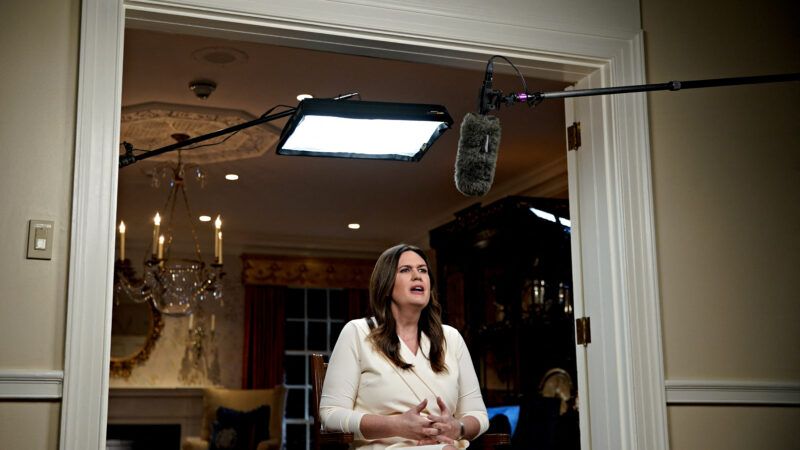Sarah Huckabee Sanders' State of the Union Response Offers a Grim Glimpse of the GOP's Future
Biden's speech offered plenty of opportunity to present a counter-narrative to continued taxes and spending. Instead Sanders went a different direction.

Although President Joe Biden has yet to formally announce whether he will run for reelection in 2024, last night's State of the Union seemed to indicate what issues would dominate Democratic politics over the next 18 months: higher taxes, economic protectionism, and a bold stance against "resort fees."
Unfortunately, Arkansas Gov. Sarah Huckabee Sanders's response speech suggested that the Republican counter will be light on policy and heavy on grievances.
The State of the Union response is a thankless job. After the president delivers a comprehensive address to Congress from the House chamber, a rival politician must try to match the pageantry in a fraction of the time against a more austere backdrop. But it can also offer the opportunity to draw a direct contrast to the president's agenda.
Sanders' 15-minute rebuttal was not interested in brass tacks, as evidenced by lines like, "I'm the first woman to lead my state, and [Biden is] the first man to surrender his presidency to a woke mob that can't even tell you what a woman is."
Sanders could have used the speech to challenge the Biden administration's ambitious spending proposals even while inflation and the national debt remain serious problems. Instead, she touted that her first act as governor included banning the word "Latinx" from official government use and forbidding schools from teaching critical race theory. This conservative fixation may or may not be of any consequence to most voters.
Sanders briefly addressed COVID-19 policy by saying that she "repealed COVID orders and said 'never again' to authoritarian mandates and shutdowns." But the majority of her speech was a missed opportunity. When Sanders mentioned Democrats' "trillions in reckless spending and mountains of debt," it was to decry that the spending had failed to stop "fentanyl [from] pouring across our southern borders."
As CBS News anchor John Dickerson noted, the last time a Democratic president had a new Republican House majority occurred in 2011, when Rep. Paul Ryan (R–Wisc.), chairman of the House Budget Committee, delivered the response to President Obama's State of the Union. Ryan spent much of the speech talking about the economy, the deficit, and the national debt. He also noted that Republicans and Democrats constituted a choice between limited government or a government whose "growth is left unchecked and unchallenged."
Sanders, on the other hand, presented the choice of Republicans and Democrats as a contrast between "freedom and peace" and "woke fantasies," where "Big Government colludes with Big Tech to strip away the most American thing there is: your freedom of speech."
Sanders is unlikely to be a force in 2024 national politics, but the speech signaled what Republicans would likely focus on over the next 18 months. As Josh Barro wrote last week, Presidents Ronald Reagan and George W. Bush each provided optimistic versions of Republican governance, proposing national prosperity and "compassionate conservatism," respectively. But today's Republican party is characterized by "mostly bad, bitter feelings;" corporations and the military are now "woke" and should each be brought to heel; by legislative force, if necessary. Florida Gov. Ron DeSantis, who is broadly popular in his state and a likely 2024 presidential candidate, has turned this ethos into a series of punitive steps against disfavored groups and companies.
To the extent that last night was a preview of the next 18 months, it bodes poorly for the 2024 presidential contest.


Show Comments (101)